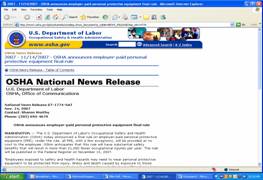OSHA National News Release
OSHA announces employer-paid personal protective equipment final rule

WASHINGTON -- The U.S. Department of Labor's Occupational Safety and Health Administration (OSHA) today announced a final rule on employer-paid personal protective equipment (PPE). Under the rule, all PPE, with a few exceptions, will be provided at no cost to the employee. OSHA anticipates that this rule will have substantial safety benefits that will result in more than 21,000 fewer occupational injuries per year. The rule will be published in the Federal Register on November 15, 2007.
"Employees exposed to safety and health hazards may need to wear personal protective equipment to be protected from injury, illness and death caused by exposure to those hazards," said Assistant Secretary of Labor for OSHA Edwin G. Foulke Jr. "This final rule will clarify who is responsible for paying for PPE, which OSHA anticipates will lead to greater compliance and potential avoidance of thousands of workplace injuries each year."
The final rule contains a few exceptions for ordinary safety-toed footwear, ordinary prescription safety eyewear, logging boots, and ordinary clothing and weather-related gear. The final rule also clarifies OSHA's requirements regarding payment for employee-owned PPE and replacement PPE. While these clarifications have added several paragraphs to the regulatory text, the final rule provides employees no less protection than they would have received under the 1999 proposed standard.
The rule also provides an enforcement deadline of six months from the date of publication to allow employers time to change their existing PPE payment policies to accommodate the final rule.
Under the Occupational Safety and Health Act of 1970, employers are responsible for providing safe and healthful workplaces for their employees. OSHA's role is to assure the safety and health of America's working men and women by setting and enforcing standards; providing training, outreach and education; establishing partnerships; and encouraging continual process improvement in workplace safety and health. For more information, visit www.osha.gov.
Click here to access this news release published on the OSHA website.